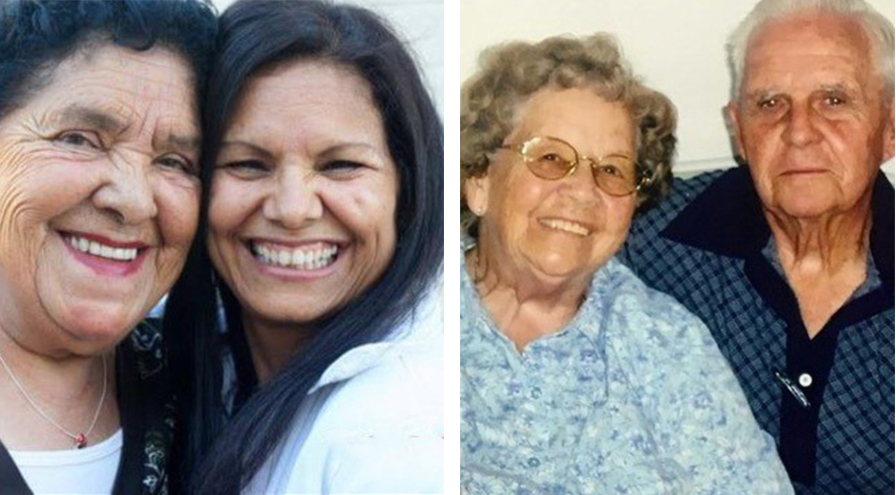
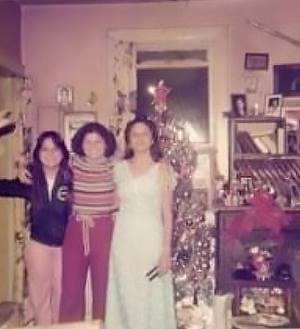
Marie (pictured in the middle between her two younger sisters) just before going into foster care
May is Foster Care Awareness Month, a chance to recognize the work of dedicated moms and dads to provide a foster home of safety, support, and love to children who’ve endured terrible circumstances. One of our own, patient care technician Marie Landon from Cedar City Hospital, says foster care saved her life and prepared her to become a compassionate caregiver.
Marie was born in Chihuahua, Mexico, and moved to Tijuana, Mexico, when she was four.
“We called Tijuana ‘TJ’ for short,” says Maria. “And my earliest memories of TJ include my father drinking, and my angel mother doing everything she could to protect us from him.”
Her parents’ relationship appeared to start like a fairytale, says Marie.
“My mom, Maria, was 20 years old and a nurse at a hospital in Chihuahua and met my father, José, when he was hospitalized for tuberculosis,” says Marie. “My mother took great care of him while he had to have half his lung removed. He was doing so poorly they sent for a priest to read him his last rites. While he was preparing to die, my father knew my mother already had a four-year-old little girl and he said, ‘If you’ll marry me, I’ll adopt your little girl and then I’ll leave everything to you both when I die.’”
Miraculously though, José ended up surviving the tuberculosis and he married Maria. They, along with Maria’s little girl, Sylvia, went to live with José’s uncle, who was a wealthy Governor of Chihuahua.
“My older brother George was born at their estate, I was born there, and so were my two younger sisters Margarita and Teresa,” says Marie. “My father and my uncle eventually had a big falling out, and our family then moved to TJ.”
While in Tijuana, Marie’s little sister, four-year-old Margarita, accidentally fell off a retaining wall while playing outside and severely fractured her skull. She was sent to a specialty children’s hospital in California to save her life and spent months there recovering.
“It was decided we all needed to move to California so our parents could be closer to her,” says Marie. “The paperwork to legally immigrate was extensive and took a long time, but finally was completed, and we all moved to Arcadia, California. My dad and mom found jobs as a caretaker and housekeeper for a home there, and the job allowed us all to live on the property. Each of us worked very hard to support our family. Even as little kids we’d pull weeds with my mom and dad. We worked strawberry fields too, just to pay the bills.”
After some time, Marie’s dad started another job at a fumigation place, but it irreparably damaged his already weakened lungs, and he went on disability to collect welfare for the family. “That’s when things went from bad to much worse,” says Marie. “He didn’t believe he had a purpose, and he began to drink again. A lot.”
And though she was known as a happy child and always smiling, “You wear the ‘mask of a clown’ when you live in a violent home,” says Marie. “Nobody knew that behind my smile was a whole lot of pain and terror.”
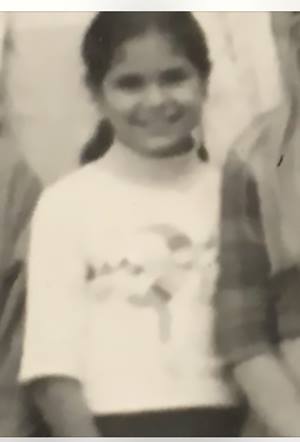
Marie, age 10
The violence would often happen without warning. “My dad would be watching TV, and we’d walk by to go to our room, and suddenly he’d just kick us, as hard as he could, right out of the blue,” says Marie. “I remember trying to gather courage to even walk past him, planning to myself, ‘OK, I have to go by him, so I’ll run as fast as I can, I can do this. Go!’ We lived in a constant state of anxiety and fear. He’d fly into a rage, and start knocking dressers over, throwing china, breaking things. I remember hiding under the table many times, absolutely scared to death. I would have bruises, welts, all over me, belt buckle marks from him beating us with a belt, all while growing up. And the beatings were for no reason. My dad would try to force my mom to hit us too, screaming at her, ‘You’d better hit them, or I will!’ When he'd do that, mom would take us in our room holding a belt and she’d hit the bed with the belt, pretending she was hitting us, but asked us to scream so our dad would think she was really hitting us.”
The same violence was also endured by their mother.
“I recall jumping on my father and yanking his hair to try and stop him from beating her up,” says Marie. “He would, you know, do something like crack a Coke bottle over her head. The screaming would start, the neighbors would call the police, and the police would split everyone up, talk to us individually. But charges were never filed and the abuse continued.”
Marie was a junior at Arcadia High when a particular school morning became the final breaking point. “We were all having breakfast before we left for school, but we were running behind,” says Marie. “And my little sister Margarita didn’t finish her milk. As we were getting ready to leave, my father spotted the unfinished milk and demanded, ‘Why didn’t you finish that?’ She wasn’t as afraid of my dad as the rest of us were. She shot back, ‘I was full!’ Well, that escalated into a huge fight. He shoved Margarita and she fell backward onto my brother’s bed, and he began slapping her. I jumped on top of him and tried to pull him off. I remember I ripped some of his shirt because I was pulling so hard. He turned around and kept smacking me so hard that he broke his watch.”
Marie screamed at her two younger siblings to run, and they ran away while Marie tried to escape. She finally was able to flee and ran to the high school, later learning that her two sisters were so terrified they had hidden under the freeway bridge until school was over.
“I get to school, and sit down, but I’m late,” says Marie. “I was a model student; I was never late. My teacher knew something must have happened, so she said, ‘Maria, I already sent the attendance to the office, so you’ll need to go down there and tell them you’re here.’ I was still shaking but I walked down to the office window. In California, everything is outside, like our lockers, even the office window is outside. I went up to the window and the office secretary asked me, ‘Why are you late?’
“I was so beat down, so low, I decided to tell. I said, ‘My dad was hitting my sister, and he got on top of her, and I was trying to pull him off…’ And the secretary was like, ‘Whoa, whoa, whoa! What? Come inside right now! You’re going to talk to our dean Mr. Kramer and tell him everything you just told me.’
“I went in, told him what had happened, and before I’d left his office, Dean Kramer said, ‘We have someone here for you to talk to.’ They had a social worker out there already waiting for me.”
Maria says this social worker, Mrs. Kinzer, would become one of the most powerful forces for good in her life.
“We talked and Mrs. Kinzer said, ‘Look, this is going to be rough for your mom, and I’m sure she’s not going to want to face this, but this is not how life is, honey. You are living in hell,’” recalls Marie. “It had never even occurred to me, up to that point, that our family life was any different than anyone else’s.
“Mrs. Kinzer then said, ‘We’re going to talk to your mom about taking you girls and leaving your dad; getting you into a shelter.’
“I started to cry, ‘No! We can’t do that! Our dad will come after us, he’ll kill us! He will find us! He has an all-seeing eye, even if I’m scratching my nose he sees me!’ When you live in that kind of situation for so long, you truly believe that your abuser is all-powerful.”
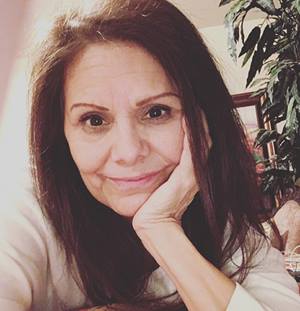
Marie (pictured) says, “I like the woman I’ve become. It took a village to raise me and they did a good job. My life experiences and choices have made me who I am today.”
The second option Mrs. Kinzer offered was foster care. “Of the two options, to me, that sounded better,” says Marie.
When Marie got home that day, she talked with her mom in secret about what had happened at school, and about their options.
“As painful as it was for her, she ultimately realized something had to be done,” says Marie. “It broke her heart, but she agreed to meet with social services. My oldest sister lived in the back of a home that was just across the street from us, while my older brother George was 18 and out of high school, so it was just me and my two sisters left.
“We made a plan: That night each girl would secretly pack needed items in a bag, and in the morning pretend we were going to school, but walk to our oldest sister’s place instead. Our mom would meet us there after we left and we’d all talk with the social worker about our options.”
“I can only imagine what my mom was thinking and the pain she was going through,” says Marie. “I felt so guilty. I felt like I destroyed my family because I’d spoken up. But you finally get to a place where you say, ‘This has to stop.’”
The next morning, they all followed the plan and went to Marie’s sister’s home. Her mom, Maria, didn’t speak English, so Marie interpreted for the social worker.
“I told my mom, ‘One option is you pack a bag and we all move out together to a shelter,’” says Marie. “She was like, ‘Oh no, what if he finds us?’ We all were afraid of him killing us if he found us, or him killing himself. As hard as it is to understand outside of it, even after all he had done, each of us felt profound guilt. Even when he’d get drunk and violent, I felt I was responsible for his behavior. While it sounds crazy, it’s a very real thing you feel.”
Marie says her mom wept, and through her tears said she couldn’t leave their dad. “I was actually grateful she decided not to leave,” says Marie. “I said, ‘Yes mom, you stay then, we’ll go into foster care. You stay home with dad, then I know he won’t kill himself.’ We weren’t sure how Dad would receive an income, as he received welfare for all of us children. But we needed to be safe, and foster care was going to make us safe.”
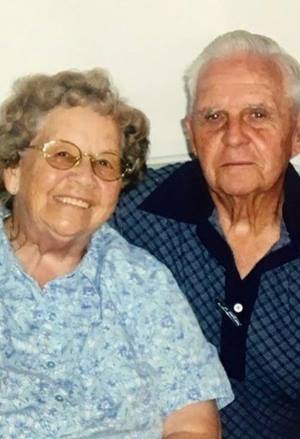
Marie’s foster parents, Ethel and Tom Vehawn
It was decided. Marie and her sisters would enter foster care.
“My mom signed the papers that morning, crying as she did,” says Marie. “And she did this for us. I said, ‘Mom, I love you. You’ll always be our mom.’ The Social Services team was there with Mrs. Kinzer, and it was time to go. In the Hispanic culture, the oldest child present is given the authority and elevated respect, so I got to sit in the front seat of this little car as we prepared to leave. I had always kept a journal and decided to write in it as we drove away. I remember writing, ‘Here we are, on our way to freedom.’”
The Social Services team brought the girls to their offices and made phone calls all the rest of the day and into the night to try and place the three sisters together. “Mrs. Kinzer didn’t want to split us up,” says Marie. “But at the time no one wanted three teenage Hispanic girls in California.”
Mrs. Kinzer found a home for two of the sisters, and another home for the third, in different cities. “As the oldest present, I had to make a decision about who would go where,” says Marie. “My baby sister, Margarita, we called her Grit, was 12. The next older sister, Teresa, we called her Tree, was 15. I said, ‘Tree, somebody has to take care of Grit, she’s still young, so I will take Grit with me.”
Marie and Grit lived in a few different homes for a time, trying to find a good fit.
“Sometimes there were challenges with a parent, sometimes there were challenges with another child in the home,” says Marie. “After a bit, we realized it wasn’t going to be possible for Grit and me to stay together and find a good home, so Mrs. Kinzer found a good home for Grit, and she found a good home for me.
“I laugh when I remember how Mrs. Kinzer billed this new possible foster home to me: ‘It’s with a great Mormon woman! She makes her own preserves and bread! She sews!’”
Mrs. Kinzer went on to explain that this particular foster home only took babies, but Mrs. Kinzer personally knew the parents, and felt Marie and this family, the Vehawns, would be a great fit. Mrs. Kinzer talked the Vehawns into taking Marie on a trial basis, to see if it would work.
“The first thing I noticed when I arrived at their home was this tiny little woman, she’s like 4’9” and she’s adorable.” says Marie. “Her name was Ethel Vehawn and her husband was Tom. They had two biological children and had also adopted two babies, so they had a few little ones there already. One was a crack baby, a little boy, and when he’d first arrived all his teeth had been rotted out because of neglect. The Vehawns had adopted him and his older sister.”
It was June and the Vehawns were planning a summer vacation to Yellowstone National Park. “Up to this point I’d never traveled anywhere beyond where we lived,” says Marie. “How I hoped they’d take me. And fortunately, they agreed to be my foster parents, so I got to go on the trip. We set out on the road, together, safe, and happy, seeing the sights, and oh, it was the most beautiful thing ever.”
And it turns out Mrs. Kinzer knew exactly what she was doing. Marie flourished under the attentive, loving care of the Vehawns, who cared deeply about Marie and wanted to help keep her connection to her siblings and family strong.
“Mom Vehawn was insistent to get me with my sisters at every possibility,” says Marie. “She’d always say, ‘We need to get you girls together,’ and every weekend she’d work to coordinate us spending time together. She’d also say, ‘If you want to see your mom and dad, I’ll drive you there.’ We weren’t ready for that, so instead, my mom would come over to visit us.”
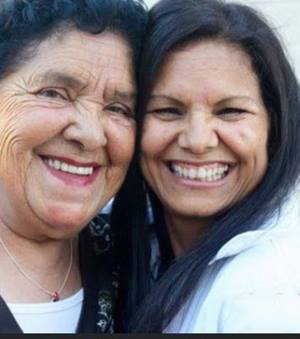
Marie with her mother Maria. Marie says, “I returned to her biological family life after I married. My foster mom and dad made sure I always kept that connection.”
As Marie began to experience what a home was like without violence, her resentment grew. “I was a little angry my mom didn’t leave my dad,” says Marie. “I felt like, ‘How dare you let him beat us and beat you? I’d never let that happen to my children.’ My mom didn’t admit it until later, but she was jealous of my foster mom, that she could provide a home of peace and safety.”
Later in her life, when Marie became a single parent with six children, she says this helped her understand the deep pain and complexity of what her mother went through, just to survive.
“It has taken time and work, but I’d say I’ve forgiven my mother,” says Marie. “My mom and dad stayed together after we left. I learned later from the neighbors my father had told everyone his girls were in a girl’s home for running away.”
As for her new home, Marie says it provided a level of safety and stability she’d never known. “I decided to change the spelling of my name, to reflect my new self,” says Marie. “I was born Maria, and I grew up being called Mary. I didn’t like being Maria, I didn’t like being Mary. When I entered foster care, I decided to change my name to Marie. I wanted to start a new life. My foster parents called me Marie. I left Mary behind.”
Marie says Mom Vehawn’s unconditional love was a lifeline and source of strength and comfort through a time of great change and uncertainty.
“No matter what, Mom Vehawn was there for me every minute, supporting me in whatever I chose for my life. Just a rock,” says Marie.
While Marie and her siblings have had difficult trials of their own, thanks to supportive, safe foster care they’ve been able to build better lives than where they’d come from. Mom Vehawn remains a loving, devoted mom to Marie.
“Mom Vehawn is in her 90s and still going strong, and she’s very close to me and to all my children,” says Marie. “My youngest child, Rachel, is on the autism spectrum and sometimes Rachel calls Mom Vehawn twice a week just to say hi and tell her about her life. Rachel loves her.
“Mom Vehawn has gone through big challenges, and Dad Vehawn passed away three years ago. One of her two biological children just passed away from cancer, the other she’s losing to cancer right now, too. One of her adopted children struggles terribly with addiction and is in and out of rehab. Mom Vehawn continues to love her and be there for her.”
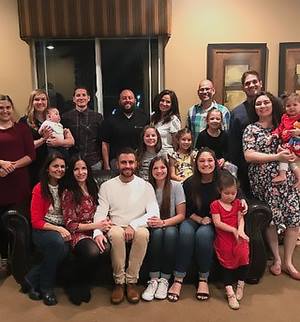
Marie with most of her family today, minus three grandchildren
“Life has had some extremely painful challenges, but also, life is what you make it,” says Marie. “Mom Vehawn, despite the challenges she had in her life, on an act of pure faith, took in an abused Hispanic teenage girl and loved her as her own. Gave her stability, and safety, and support. Loved her no matter what. She has always stood by me and has been a constant source of love to me. Her serving me has helped me find my purpose in life.”
Marie says this purpose is to love and care for others. “Serving others brings out who you really are,” says Marie. “We were the recipients of the Salvation Army countless times. They’d give my mom vouchers to be able to get us clothing at thrift stores, or for Christmas presents. So, every year I ring the bell for the Salvation Army and I volunteer at Southern Utah University for the Angel Tree program that provides needed items and gifts at Christmas for families in need. These kinds of programs were kind and generous to us, as those suffering from poverty and abuse. I want to give back in some small way what we were given.”
That same love and care Marie says is vital to a life well lived also includes taking kind care of yourself. “I’m a big believer in mental health counseling,” says Marie. “It helps to identify old patterns and create new, healthy ones. Setting and enforcing important and healthy boundaries is also part of this.”
And just like Mom Vehawn, Marie never judges anyone.
“We have no idea what each of us have gone through in our lives,” says Marie. “You can be sitting next to someone and have absolutely no idea that they might be going through the worst time in their life. I know what crushing pain feels like. I know what terror feels like. I know what it is to feel utterly worthless. I know agony. And it’s humbled me. It’s why I feel the deep compassion that I do. I’ve been where they’ve been. Perhaps not in the exact same way, but pain is pain. I can truly be there for someone else because I truly understand. Mom Vehawn was there for me. She loved me without condition. I want to be that for others.”
Marie’s desire to help others also eventually led her to Intermountain. She was living in St. George when she became a single mother with six children to raise.
“I knew I needed some kind of a skilled job, and I knew that caring for people was the best choice for me,” she says. “It just felt natural to find where I could help others. I looked online and found that Cedar City Hospital was hiring certified nursing assistants. I was able to get the job and I’ve loved it ever since.”
Marie’s manager, Amy Bennett, RN, says Marie has been an invaluable member of the Cedar City team for many years and her background has given her a unique ability to empathize with others.
“Her strengths are really helping patients and staff feel safe and at ease,” Amy says. “She continually goes out of her way to build healing connections with her patients and with fellow staff members. She’s a clinical coach for all our new patient care technicians and loves to mentor new staff. Marie has a true gift of recognizing when someone needs a little pick up and lift to their day.”
Learn more about becoming a foster parent and other ways to support foster care in Utah, Idaho, and Nevada. Learn more about how you can help recognize and prevent child abuse at howtopreventabuse.org, PCAUtah.org, and primarychildrens.org/safeandhealthyfamilies.

